高中英语译林牛津版模块4Unit 2 Sporting events Grammar and usage 课件(共61张)
文档属性
| 名称 | 高中英语译林牛津版模块4Unit 2 Sporting events Grammar and usage 课件(共61张) | 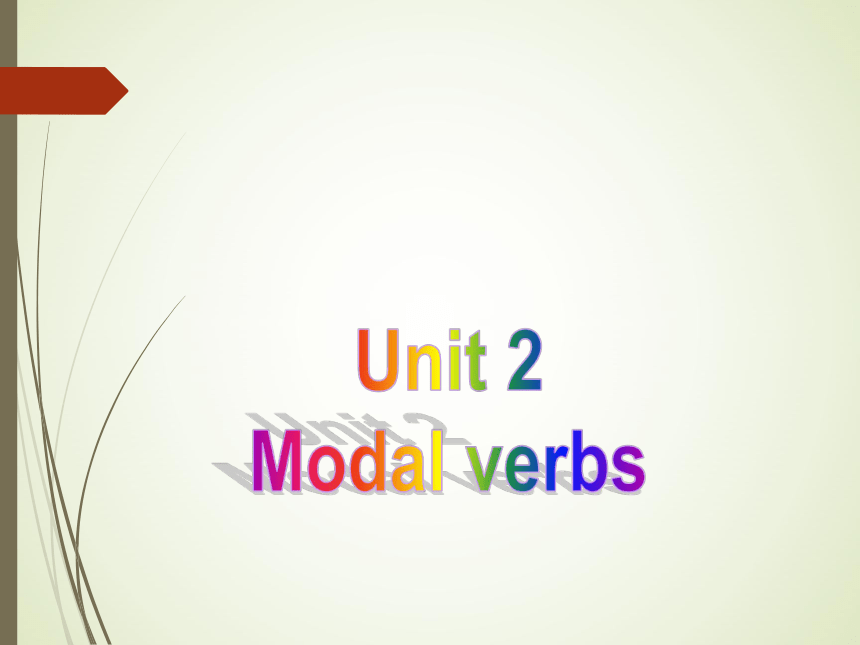 | |
| 格式 | zip | ||
| 文件大小 | 1.0MB | ||
| 资源类型 | 教案 | ||
| 版本资源 | 牛津译林版 | ||
| 科目 | 英语 | ||
| 更新时间 | 2019-05-01 08:29:59 | ||
图片预览

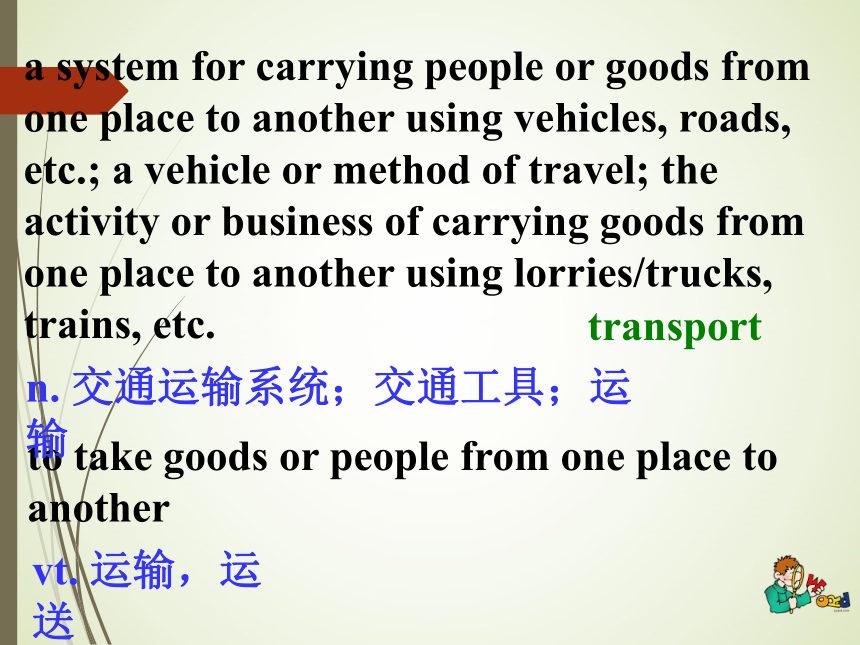
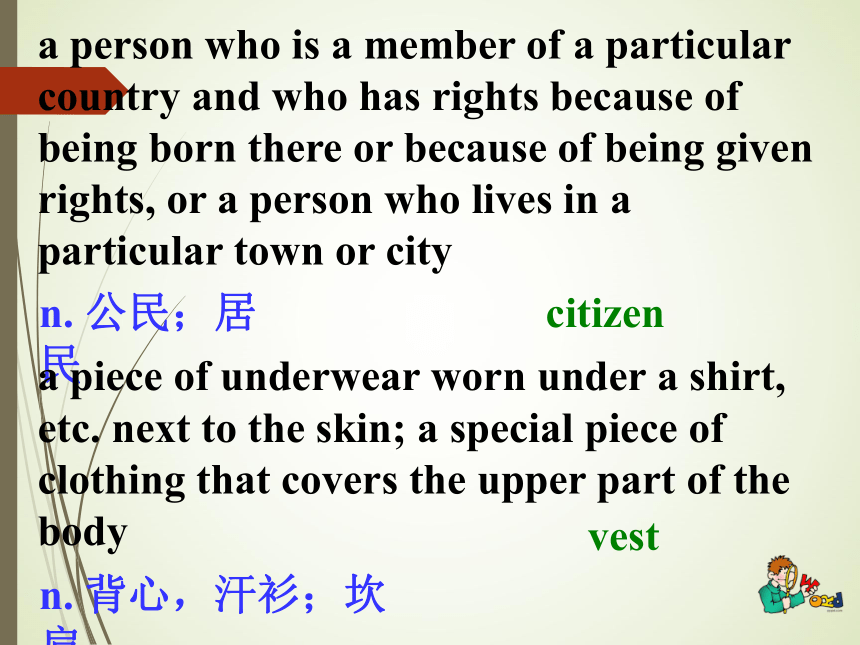
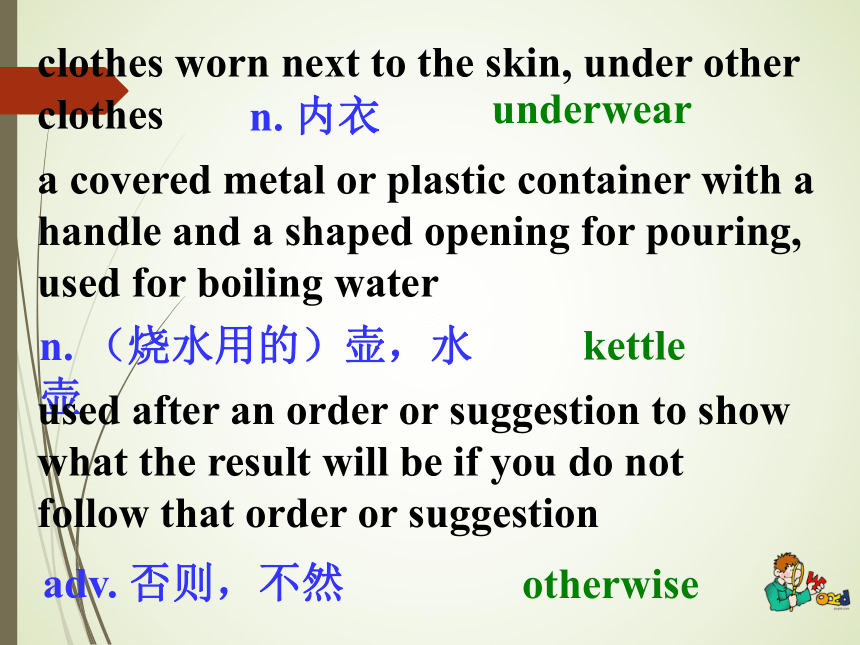
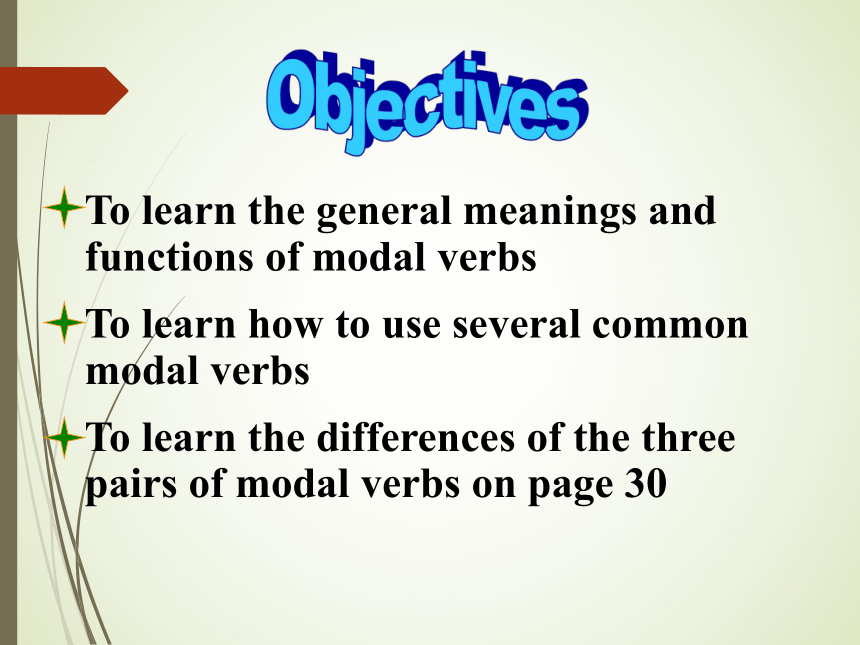
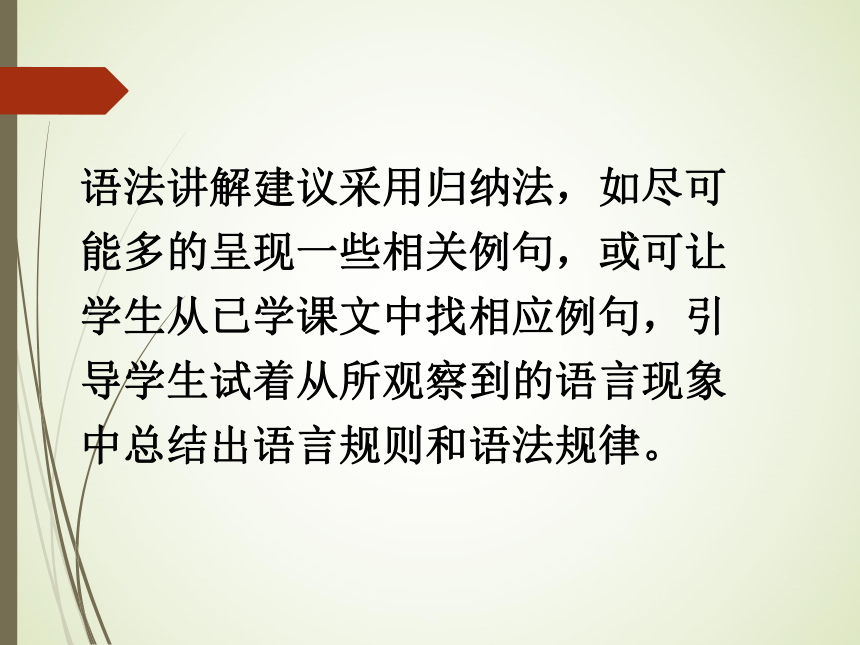

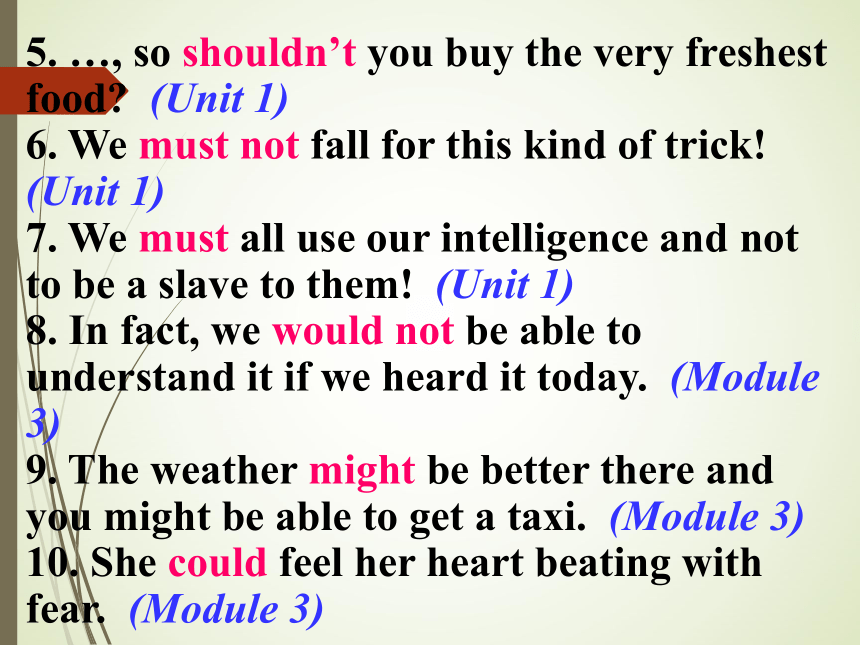

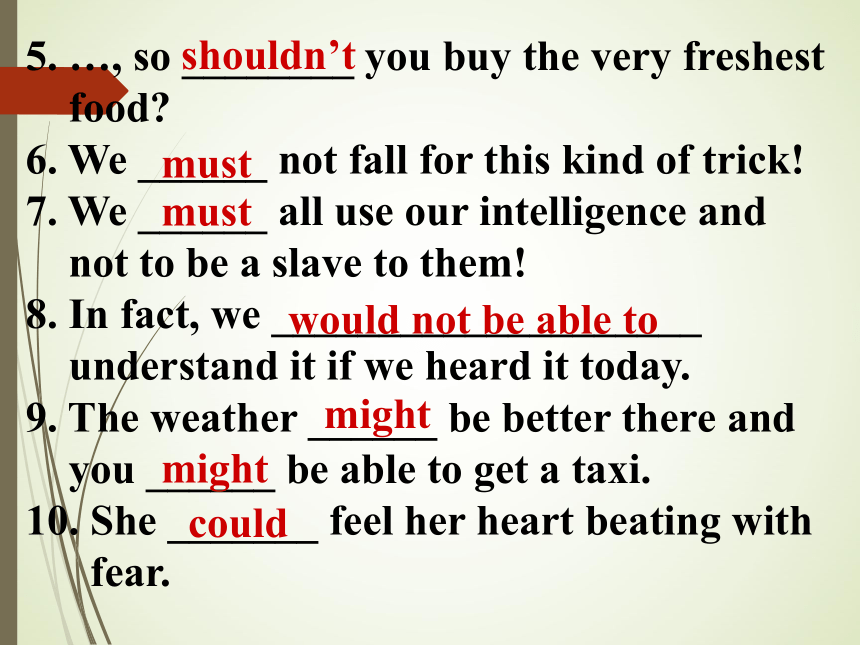
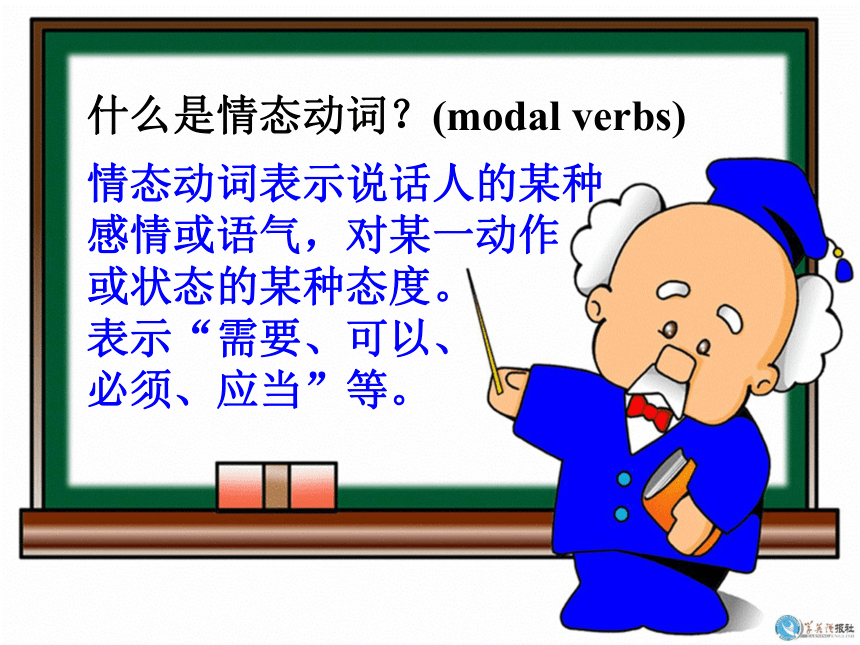
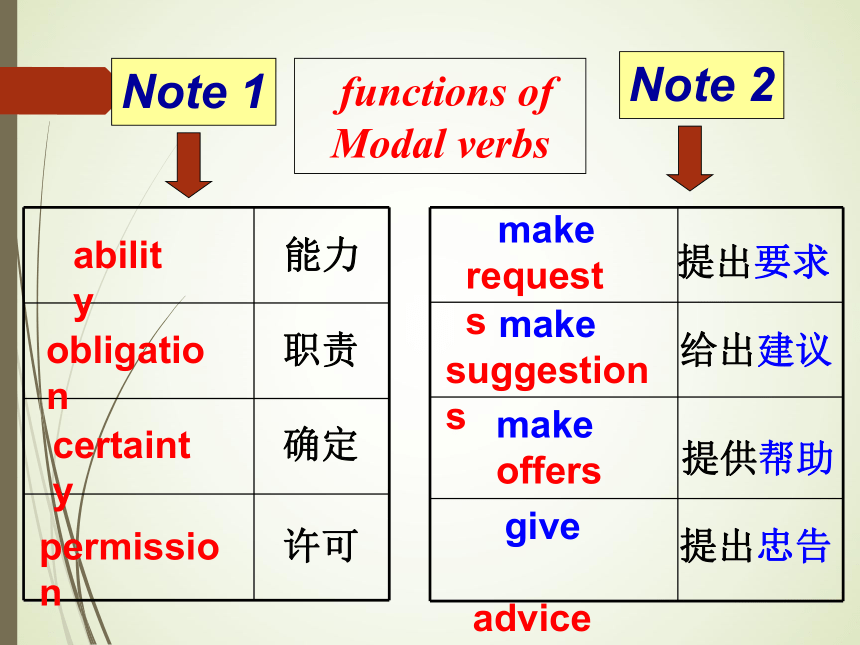
文档简介
课件61张PPT。Unit 2
Modal verbs to take goods or people from one place to another transporta system for carrying people or goods from one place to another using vehicles, roads, etc.; a vehicle or method of travel; the activity or business of carrying goods from one place to another using lorries/trucks, trains, etc. n. 交通运输系统;交通工具;运输vt. 运输,运送a person who is a member of a particular country and who has rights because of being born there or because of being given rights, or a person who lives in a particular town or city citizenvestn. 公民;居民n. 背心,汗衫;坎肩a piece of underwear worn under a shirt, etc. next to the skin; a special piece of clothing that covers the upper part of the bodyclothes worn next to the skin, under other clothesunderwearkettleotherwisen. 内衣n. (烧水用的)壶,水壶adv. 否则,不然a covered metal or plastic container with a handle and a shaped opening for pouring, used for boiling waterused after an order or suggestion to show what the result will be if you do not follow that order or suggestion ObjectivesTo learn the general meanings and functions of modal verbs
To learn how to use several common modal verbs
To learn the differences of the three pairs of modal verbs on page 30语法讲解建议采用归纳法,如尽可能多的呈现一些相关例句,或可让学生从已学课文中找相应例句,引导学生试着从所观察到的语言现象中总结出语言规则和语法规律。1. At the ancient Olympics, by tradition the athletes were all men and they had to compete wearing no clothes.
2. I am sure the whole of China must have felt proud when Xu Haifeng won the first gold medals.
3. Today, both male and female athletes from around the world can take part.
4. Nowadays, we can find advertisements almost wherever we go. (Unit 1)5. …, so shouldn’t you buy the very freshest food? (Unit 1)
6. We must not fall for this kind of trick! (Unit 1)
7. We must all use our intelligence and not to be a slave to them! (Unit 1)
8. In fact, we would not be able to understand it if we heard it today. (Module 3)
9. The weather might be better there and you might be able to get a taxi. (Module 3)
10. She could feel her heart beating with fear. (Module 3)Fill in the blanks.
At the ancient Olympics, by tradition the
athletes were all men and they _______ compete wearing no clothes.
2. I am sure the whole of China ______ have felt proud when Xu Haifeng won the first gold medals.
3. Today, both male and female athletes from around the world _____ take part.
4. Nowadays, we _____ find advertisements almost wherever we go. had tomustcancango
Ready?5. …, so ________ you buy the very freshest
food?
6. We ______ not fall for this kind of trick!
7. We ______ all use our intelligence and
not to be a slave to them!
8. In fact, we ____________________
understand it if we heard it today.
9. The weather ______ be better there and
you ______ be able to get a taxi.
10. She _______ feel her heart beating with
fear. shouldn’tmustmustwould not be able tomightmightcould情态动词表示说话人的某种
感情或语气,对某一动作
或状态的某种态度。
表示“需要、可以、
必须、应当”等。 什么是情态动词?(modal verbs) Note 2Note 1 functions of Modal verbsabilitycertaintypermissionobligation make
requests make
suggestions make
offers give
advice 能力职责确定许可 提出要求 给出建议提供帮助提出忠告Words like can, will, may, must, and a
few others are called modals. Modal
verbs help other verbs express a meaning
or an idea. Some common uses of the
modals are these:
Ability: He can speak English now.
He couldn’t speak English a
year ago.
I’m not able to come to the game
on Friday.Obligation: You must fasten your seat belts.
(strong)
You should pay attention.
(weak)
You ought to pay attention.
Certainty: It may rain.
How could I forget an important
thing like that?
He can’t / couldn’t have known
the result.
Permission: All passengers may now board.
We can board now.Make requests:
Can you help me with my training?
Make suggestions:
Shall we do some exercise this morning?
Make offers:
I’ll wash your sports jacket.
Shall I get a ticket for you?
Give advice:
You should not/ought not to eat a lot before swimming.表示推测——情态动词的重要用法+ V. 常见
must be+ V. / +
be doing+ have done+ V. mustmay/might+ V. / + be doing+ have done可以用not表示“可能不”
can’t/
couldn’tcan/could + V. / + be doing+ V.+ have done+ V. + V. / + be doing+ have done表示能力: can, could, be able to
be able to 能用于各种时态。
can / could 只能表示现在或过去的能力。
was / were able to 设法做成某事
相当于 managed to do sth.
succeeded in doing sth.1. 表示能力、许可的情态动词的用法。Notes 1) can的主要用法是:
? A.?表示体力或脑力的能力:
? eg. The girl can dance very well.
B.?表示说话者的推测、事物的可能性:
eg. Can the news be true?
C. 在口语中,can可以表示请求或允许:
eg. Can I sit here? Can/could和be able to2) could的主要用法是:
A. could是can的过去式,表示与过去 有关的能力和推测:
eg. We all knew that the young man
couldn’t be a doctor.
B. could可以代替can表示请求,但语气较can客气、委婉:
eg. Could you lend me your dictionary?
Could I use your bike?3) be able to 的用法:
表示能力时,比can更正式。
B. be able to 可用于不同的时态,也可用
于另一个情态动词之后。
I’m sorry I haven’t been able to play tennis
with you recently.
Wang Gang might be able to win the chess
game.can和could接动词的完成形式,表示可能已经做某事。can用在否定和疑问句中,表示不相信、怀疑等态度。
They can't have gone out because the light is still on. 表示许可: may / might, can / could
might, could 比较委婉, 一般多用于疑
问句。
can, may 表达的语言比较随便。
在以could, might 表示征询对方意见
或表示请求时,回答应相应使用can,
may。 may常用来:
?A. 表示请求、允许:(比can较为正式)
?? eg. May I come in?
You may go now.
B. 表示说话人的猜测: “也许” “可能”:
通常只用于肯定句和否定句中。may和might eg. I believe the man is from England.
But I may be wrong.
The guest may arrive this afternoon. 在肯定句中,may的可能性比can高,may表示现实的可能性,can表示理论上的可能性。如: The road may be blocked.
这条路可能不通了。
The road can be blocked.
这条路可能会是不通的。
在疑问句中,表示可能性用can。
如:Where can he be? 他会在哪呢? C. 表示祝愿;但语气较正式:
eg. May you succeed!
May you have a good journey!
might 的用法有:
A. 多在间接引语中表示过去的可能和允许。
eg. She said that he might take her bike.
她说他可以拿她的自行车去用。
注意:除了在间接引语外, might一般不表示过去的可能或者许可。如要表示过去的可能可以用could, 表示过去的许可可以用was (were) allowed to或者had permission to。 He might go home tomorrow.
说不定他明天会回家。
C. 表示现在的许可,语气比may较委婉,
一般用于疑问句(包括间接疑问句),
不可用于肯定句或者否定句。
如: Might I have a word with you?
我可以和你说句话吗?B. 表示现在的可能,其可能性要比 may小。2. 情态动词shall, will 的多种意义: shall / will + 动词原形: shall 可表示必须、命令、警告或征询意见。 will 可表示意愿、常出现的动作,在疑问
句中表示请求和建议。 均可表示将来。过去时为 should, would。shall和will1) shall偏重于表示“承诺”;will更多的表示
“决心,决定”。
I shall go to London to meet you next month.
Mum will make a cake for me on my
birthday.
2) 疑问句中,shall用于一三人称表示“提建议”,will用于二三人称表示“意愿”。
Shall I bring you some tea?
Will you go to see the film with us?
Will he give me his telephone number?shall和should 1) shall用于构成将来时是助动词。
shall用于征求对方的意见,表示 “决心”
是情态动词。
Perhaps I shall pay a visit to England this
winter. (助动词) Shall we go by train, Mom?
(用于征求对方的意见,情态动词)
I shall go at once.
(表 “决心”,情态动词) 2) should表示义务、建议、劝告,意为
“应该”。 “should + have + 过去分词”
表示本应该在过去做但没有做。
eg: You should keep your promise.
你应该遵守诺言。
She should have passed the exam.
她应该通过考试的。will和would 1) will是助动词还是情态动词?
will用于构成将来时是助动词。
用于表示“意志”“决心”“请求”是情态动
词。would亦同理。
I will tell you something important.
我要告诉你一件重要的事情。(助动词)? Will you tell her that I'm here?
请您告诉她说我在这儿,好吗?
(情态动词)? 2) 在疑问句中用于第二人称,提出请求或询问。
If you want help, let me know, will you?
如果你需要帮助,让我知道,好吗?? 3) would比will客气委婉。
Would you help us, please?
请您帮助我们,好吗?
I’d go there with you.
我要和你一块到那儿去。?
Your teacher wouldn’t allow it.
老师不会允许这件事。(表请求)(表意愿)(表许可)3. 表示否定的情态动词的用法:mustn’t 不准; 禁止
needn’t 没必要 ( = don’t have to )
can’t 不能; 不可能
may not 不可以; 可能不
shouldn’t 不应该 ( = ought not to )部分情态动词的否定式是情态动词中的考点之一。 注意: must not 的意思是不许可,不应该或者禁止。needn’t意思是不需要。
如:We mustn’t waste our time. --- May I take this magazine out? --- No, you mustn’t.
You needn’t practice basketball five times
a week.
must 用于一般疑问句的时候,肯定回答应该用 yes, please 或者 I’m afraid so, 其否定回答应该用 needn’t 或者 don’t have to。不同的“肯定”程度可按下列层次排列:
He is at home. (事实)
He must be at home.(非常肯定的推断)
He ought to be at home.(很可能)
He could be at home.(很可能)
He may be at home.(仅仅可能而已)
He might be at home.(或许, 非常不确定)
He couldn’t be at home.(很可能不在家)
He can’t be at home.(一定不在家)
He isn't at home.(事实) 4. 情态动词短语的使用:would like to do … would rather do …
would rather + 从句 would prefer to do ...
had better do ...5. 用于虚拟语气的情态动词:should might could would needn’t ought to情态动词的语法特征1. 情态动词不能单独做谓语,除ought
和have外,后面只能接不带to的不定式。 2. 情态动词没有人称、数的变化,但有
些情态动词,如can, will也有一般式
和过去式的变化。I think she _______ apologize
to the public.You ________ go and
see the doctor.? 我认为她应该向公众道歉。你应当去找医生看看。ought toought toFill in the blanks according to the Chinese.Titanic ______ be a good movie.We know if we keep at it
we _______ succeed.? 泰坦尼克号应该是部好电影。我们知道如果我们坚持下去就应该会成功。shouldshouldWe ______ put on warm
clothes in winter. 冬天的时候,我们不得不
穿上温暖的衣服。你必须把面粉和黄油和在一起。You _______ mix the
flour and the butter. have tohave toIn England traffic
_____ keep to the left. 在英国,车辆必须
靠左行驶。All passengers ______
wear seat belts.所有乘客都必须系安全带。mustmust(1) must (2) has to (3) should
(4) must (5) ought to (6) shouldP29Answers:Part A Part B (1) Shall (2) have to (3) can’t
(4) would (5) Could (6) might(1) can (2) can/could
(3) will/may/might/could
(4) mustn’t/shouldn’t/can’t/ought not to
(5) mustn’t/shouldn’t/can’t/ought not to
(6) can
(7) needn’t/shouldn’t/do not have toAnswers:P31Part A Part B (1) Shall (2) shall
(3) Will (4) will/shall
(5) will/shall (6) shall/willTime for reflectionought to/should have to must(obligation)
advisability necessitymight may could should ought to will(certainty)
very uncertain almost certaincan could may might(permission)
informal/spoken formal/written functions of Modal verbsabilitycertaintypermissionobligation make
requests make
suggestions make
offers give
advice 能力职责确定许可 提出要求 给出建议提供帮助提出忠告1. People are recycling many things which they _____ away in the past. (2014安徽)
A. had thrown B. will be throwing
C. were throwing
D. would have thrown
2. _______ I have a word with you? It won’t take long. (2014北京)
A. Can B. Must
C. Shall D. ShouldQuiz I: Choose the best answer. 3. — I’ve prepared all kinds of food for the picnic.
— Do you mean we _____ bring anything with us? (2014湖南)
A. can’t B. mustn’t
C. shan’t D. needn’t
4. It was sad to me that they, so poor themselves, ______ bring me food. (2014江苏)
A. might B. would C. should D. could5. Life is unpredictable; even the poorest ______ become the richest. (2014江西)
A. shall B. must C. need D. might
6. My book, The House of Hales, is missing. Who ________ have taken it? (2014陕西)
A. need B. must C. should D. could 7. When I was a child, I ____ watch TV whenever I wanted to. (2013江西)
A. should B. could
C. must D. need
8. Harry is feeling uncomfortable. He ____ too much at the party last night. (2013辽宁)
A. could drink
B. should drink
C. would have drunk
D. must have drunk9. The children ____ lost in the woods; otherwise, they would have been at the lakeside camp as scheduled. (2013陕西)
A. must have got B. must get
C. should have got D. should get
10. — Why are your eyes so red? You ___ have slept well last night. (2013四川)
— Yeah, I stayed up late writing a report.
A. can’t B. mustn’t
C. needn’t D. won’t 11. No one ____ be more generous; he has a heart of gold. (2013天津)
A. could B. must C. dare D. need
12. Since nobody gave him any help, he ____ have done the research on his own. (2013新课标II)
A. can B. must C. would D. need13. I ____ myself more — it was a perfect day. (2013浙江)
A. shouldn’t have enjoyed
B. needn’t have enjoyed
C. wouldn’t have enjoyed
D. couldn’t have enjoyed
14. The door ____ open , no matter how hard she pushed.(2013新课标I卷)
A. shouldn’t B. couldn't
C. wouldn't D. mightn'tQuiz II: 根据汉语完成句子。 A: ____________________ (我可以跟
朋友们去) to the harvest festival?
B: Yes, you may.
A: If I want to be a doctor, _________
____________ (我应该学理科吗)?
B: I think so. May I go with friendsshould Istudy science 3. I don't know where she is, she _____
___________ (可能在武汉).
4. At this moment, our teacher
_______________ (一定是在批改) our
exam papers.
5. The road is wet. It ________________
(肯定下雨了) last night.
6. Your mother _____________________
_______ (一定一直在找你).maymust be markingmust have rainedmust have been lookingbe in Wuhanfor you7. Philip ____________________________
________________________ (可能在车
祸中受了重伤).
8. --- Linda has gone to work, but her
bicycle is still here.
--- She ____________________ (可能上
班) by bus.
9. Mike _______________ (一定还没有找
到) his car, for he came to work by bus
this morning.may (might) have been hurtmay (might) have gonecan’t have foundseriously in the car accident1. 我不得不接受你的建议。
2. 未经允许,你不能来这儿。
3. 你应当去照顾你妹妹。
4. 他们想必已到那儿了。You mustn’t come here without permission. You should take care of your sister.They ought to be there by now.?I have to accept your suggestion.Quiz III: 汉译英。Zhou Jianping is interested in winter swimming and wants to practise it. He wrote a letter to his friend Li Ming, a winter swimmer, for advice. Help Li Ming complete his reply using modal verbs.Hi Jianping
I was glad to receive your letter and am happy to tell what I think about winter swimming.Quiz IV. 阅读信件,按照句子结构的语法性和上下文连贯的要求,在空格处填空。I know that you are a sports fan and like swimming very much. I’m pretty sure you (1) _____ swim very well. However, winter swimming (2) _________ be dangerous. I suggest you join a swimming club and learn from a coach. Reading a book on winter swimming will also be helpful.
Go swimming every day through summer and autumn. When winter comes, swim for just a few minutes at noon every day. cancan/couldDo some exercises as a preparation before you swim. Otherwise, you (3) ____________ hurt yourself.
To protect yourself from possible dangerous, you (4) ____________________ (not) drink before swimming. If the water is very cold, you (5) _____________________ (not) swim for too long.
When you go winter swimming, find a good place. may/might/couldmustn’t/shouldn’t/can’tmustn’t/shouldn’t/can’tIt’s important to find a place where you (6) ____ get in and out of the water easily.
Finally, you (7) _______ (not) be too worried. If you join a club and follow your coach’s advice, you will be a good winter swimmer very soon!
Yours
Li Mingcanneedn’tFinish Part C1 and Part C2 on page 100.Homework
Modal verbs to take goods or people from one place to another transporta system for carrying people or goods from one place to another using vehicles, roads, etc.; a vehicle or method of travel; the activity or business of carrying goods from one place to another using lorries/trucks, trains, etc. n. 交通运输系统;交通工具;运输vt. 运输,运送a person who is a member of a particular country and who has rights because of being born there or because of being given rights, or a person who lives in a particular town or city citizenvestn. 公民;居民n. 背心,汗衫;坎肩a piece of underwear worn under a shirt, etc. next to the skin; a special piece of clothing that covers the upper part of the bodyclothes worn next to the skin, under other clothesunderwearkettleotherwisen. 内衣n. (烧水用的)壶,水壶adv. 否则,不然a covered metal or plastic container with a handle and a shaped opening for pouring, used for boiling waterused after an order or suggestion to show what the result will be if you do not follow that order or suggestion ObjectivesTo learn the general meanings and functions of modal verbs
To learn how to use several common modal verbs
To learn the differences of the three pairs of modal verbs on page 30语法讲解建议采用归纳法,如尽可能多的呈现一些相关例句,或可让学生从已学课文中找相应例句,引导学生试着从所观察到的语言现象中总结出语言规则和语法规律。1. At the ancient Olympics, by tradition the athletes were all men and they had to compete wearing no clothes.
2. I am sure the whole of China must have felt proud when Xu Haifeng won the first gold medals.
3. Today, both male and female athletes from around the world can take part.
4. Nowadays, we can find advertisements almost wherever we go. (Unit 1)5. …, so shouldn’t you buy the very freshest food? (Unit 1)
6. We must not fall for this kind of trick! (Unit 1)
7. We must all use our intelligence and not to be a slave to them! (Unit 1)
8. In fact, we would not be able to understand it if we heard it today. (Module 3)
9. The weather might be better there and you might be able to get a taxi. (Module 3)
10. She could feel her heart beating with fear. (Module 3)Fill in the blanks.
At the ancient Olympics, by tradition the
athletes were all men and they _______ compete wearing no clothes.
2. I am sure the whole of China ______ have felt proud when Xu Haifeng won the first gold medals.
3. Today, both male and female athletes from around the world _____ take part.
4. Nowadays, we _____ find advertisements almost wherever we go. had tomustcancango
Ready?5. …, so ________ you buy the very freshest
food?
6. We ______ not fall for this kind of trick!
7. We ______ all use our intelligence and
not to be a slave to them!
8. In fact, we ____________________
understand it if we heard it today.
9. The weather ______ be better there and
you ______ be able to get a taxi.
10. She _______ feel her heart beating with
fear. shouldn’tmustmustwould not be able tomightmightcould情态动词表示说话人的某种
感情或语气,对某一动作
或状态的某种态度。
表示“需要、可以、
必须、应当”等。 什么是情态动词?(modal verbs) Note 2Note 1 functions of Modal verbsabilitycertaintypermissionobligation make
requests make
suggestions make
offers give
advice 能力职责确定许可 提出要求 给出建议提供帮助提出忠告Words like can, will, may, must, and a
few others are called modals. Modal
verbs help other verbs express a meaning
or an idea. Some common uses of the
modals are these:
Ability: He can speak English now.
He couldn’t speak English a
year ago.
I’m not able to come to the game
on Friday.Obligation: You must fasten your seat belts.
(strong)
You should pay attention.
(weak)
You ought to pay attention.
Certainty: It may rain.
How could I forget an important
thing like that?
He can’t / couldn’t have known
the result.
Permission: All passengers may now board.
We can board now.Make requests:
Can you help me with my training?
Make suggestions:
Shall we do some exercise this morning?
Make offers:
I’ll wash your sports jacket.
Shall I get a ticket for you?
Give advice:
You should not/ought not to eat a lot before swimming.表示推测——情态动词的重要用法+ V. 常见
must be+ V. / +
be doing+ have done+ V. mustmay/might+ V. / + be doing+ have done可以用not表示“可能不”
can’t/
couldn’tcan/could + V. / + be doing+ V.+ have done+ V. + V. / + be doing+ have done表示能力: can, could, be able to
be able to 能用于各种时态。
can / could 只能表示现在或过去的能力。
was / were able to 设法做成某事
相当于 managed to do sth.
succeeded in doing sth.1. 表示能力、许可的情态动词的用法。Notes 1) can的主要用法是:
? A.?表示体力或脑力的能力:
? eg. The girl can dance very well.
B.?表示说话者的推测、事物的可能性:
eg. Can the news be true?
C. 在口语中,can可以表示请求或允许:
eg. Can I sit here? Can/could和be able to2) could的主要用法是:
A. could是can的过去式,表示与过去 有关的能力和推测:
eg. We all knew that the young man
couldn’t be a doctor.
B. could可以代替can表示请求,但语气较can客气、委婉:
eg. Could you lend me your dictionary?
Could I use your bike?3) be able to 的用法:
表示能力时,比can更正式。
B. be able to 可用于不同的时态,也可用
于另一个情态动词之后。
I’m sorry I haven’t been able to play tennis
with you recently.
Wang Gang might be able to win the chess
game.can和could接动词的完成形式,表示可能已经做某事。can用在否定和疑问句中,表示不相信、怀疑等态度。
They can't have gone out because the light is still on. 表示许可: may / might, can / could
might, could 比较委婉, 一般多用于疑
问句。
can, may 表达的语言比较随便。
在以could, might 表示征询对方意见
或表示请求时,回答应相应使用can,
may。 may常用来:
?A. 表示请求、允许:(比can较为正式)
?? eg. May I come in?
You may go now.
B. 表示说话人的猜测: “也许” “可能”:
通常只用于肯定句和否定句中。may和might eg. I believe the man is from England.
But I may be wrong.
The guest may arrive this afternoon. 在肯定句中,may的可能性比can高,may表示现实的可能性,can表示理论上的可能性。如: The road may be blocked.
这条路可能不通了。
The road can be blocked.
这条路可能会是不通的。
在疑问句中,表示可能性用can。
如:Where can he be? 他会在哪呢? C. 表示祝愿;但语气较正式:
eg. May you succeed!
May you have a good journey!
might 的用法有:
A. 多在间接引语中表示过去的可能和允许。
eg. She said that he might take her bike.
她说他可以拿她的自行车去用。
注意:除了在间接引语外, might一般不表示过去的可能或者许可。如要表示过去的可能可以用could, 表示过去的许可可以用was (were) allowed to或者had permission to。 He might go home tomorrow.
说不定他明天会回家。
C. 表示现在的许可,语气比may较委婉,
一般用于疑问句(包括间接疑问句),
不可用于肯定句或者否定句。
如: Might I have a word with you?
我可以和你说句话吗?B. 表示现在的可能,其可能性要比 may小。2. 情态动词shall, will 的多种意义: shall / will + 动词原形: shall 可表示必须、命令、警告或征询意见。 will 可表示意愿、常出现的动作,在疑问
句中表示请求和建议。 均可表示将来。过去时为 should, would。shall和will1) shall偏重于表示“承诺”;will更多的表示
“决心,决定”。
I shall go to London to meet you next month.
Mum will make a cake for me on my
birthday.
2) 疑问句中,shall用于一三人称表示“提建议”,will用于二三人称表示“意愿”。
Shall I bring you some tea?
Will you go to see the film with us?
Will he give me his telephone number?shall和should 1) shall用于构成将来时是助动词。
shall用于征求对方的意见,表示 “决心”
是情态动词。
Perhaps I shall pay a visit to England this
winter. (助动词) Shall we go by train, Mom?
(用于征求对方的意见,情态动词)
I shall go at once.
(表 “决心”,情态动词) 2) should表示义务、建议、劝告,意为
“应该”。 “should + have + 过去分词”
表示本应该在过去做但没有做。
eg: You should keep your promise.
你应该遵守诺言。
She should have passed the exam.
她应该通过考试的。will和would 1) will是助动词还是情态动词?
will用于构成将来时是助动词。
用于表示“意志”“决心”“请求”是情态动
词。would亦同理。
I will tell you something important.
我要告诉你一件重要的事情。(助动词)? Will you tell her that I'm here?
请您告诉她说我在这儿,好吗?
(情态动词)? 2) 在疑问句中用于第二人称,提出请求或询问。
If you want help, let me know, will you?
如果你需要帮助,让我知道,好吗?? 3) would比will客气委婉。
Would you help us, please?
请您帮助我们,好吗?
I’d go there with you.
我要和你一块到那儿去。?
Your teacher wouldn’t allow it.
老师不会允许这件事。(表请求)(表意愿)(表许可)3. 表示否定的情态动词的用法:mustn’t 不准; 禁止
needn’t 没必要 ( = don’t have to )
can’t 不能; 不可能
may not 不可以; 可能不
shouldn’t 不应该 ( = ought not to )部分情态动词的否定式是情态动词中的考点之一。 注意: must not 的意思是不许可,不应该或者禁止。needn’t意思是不需要。
如:We mustn’t waste our time. --- May I take this magazine out? --- No, you mustn’t.
You needn’t practice basketball five times
a week.
must 用于一般疑问句的时候,肯定回答应该用 yes, please 或者 I’m afraid so, 其否定回答应该用 needn’t 或者 don’t have to。不同的“肯定”程度可按下列层次排列:
He is at home. (事实)
He must be at home.(非常肯定的推断)
He ought to be at home.(很可能)
He could be at home.(很可能)
He may be at home.(仅仅可能而已)
He might be at home.(或许, 非常不确定)
He couldn’t be at home.(很可能不在家)
He can’t be at home.(一定不在家)
He isn't at home.(事实) 4. 情态动词短语的使用:would like to do … would rather do …
would rather + 从句 would prefer to do ...
had better do ...5. 用于虚拟语气的情态动词:should might could would needn’t ought to情态动词的语法特征1. 情态动词不能单独做谓语,除ought
和have外,后面只能接不带to的不定式。 2. 情态动词没有人称、数的变化,但有
些情态动词,如can, will也有一般式
和过去式的变化。I think she _______ apologize
to the public.You ________ go and
see the doctor.? 我认为她应该向公众道歉。你应当去找医生看看。ought toought toFill in the blanks according to the Chinese.Titanic ______ be a good movie.We know if we keep at it
we _______ succeed.? 泰坦尼克号应该是部好电影。我们知道如果我们坚持下去就应该会成功。shouldshouldWe ______ put on warm
clothes in winter. 冬天的时候,我们不得不
穿上温暖的衣服。你必须把面粉和黄油和在一起。You _______ mix the
flour and the butter. have tohave toIn England traffic
_____ keep to the left. 在英国,车辆必须
靠左行驶。All passengers ______
wear seat belts.所有乘客都必须系安全带。mustmust(1) must (2) has to (3) should
(4) must (5) ought to (6) shouldP29Answers:Part A Part B (1) Shall (2) have to (3) can’t
(4) would (5) Could (6) might(1) can (2) can/could
(3) will/may/might/could
(4) mustn’t/shouldn’t/can’t/ought not to
(5) mustn’t/shouldn’t/can’t/ought not to
(6) can
(7) needn’t/shouldn’t/do not have toAnswers:P31Part A Part B (1) Shall (2) shall
(3) Will (4) will/shall
(5) will/shall (6) shall/willTime for reflectionought to/should have to must(obligation)
advisability necessitymight may could should ought to will(certainty)
very uncertain almost certaincan could may might(permission)
informal/spoken formal/written functions of Modal verbsabilitycertaintypermissionobligation make
requests make
suggestions make
offers give
advice 能力职责确定许可 提出要求 给出建议提供帮助提出忠告1. People are recycling many things which they _____ away in the past. (2014安徽)
A. had thrown B. will be throwing
C. were throwing
D. would have thrown
2. _______ I have a word with you? It won’t take long. (2014北京)
A. Can B. Must
C. Shall D. ShouldQuiz I: Choose the best answer. 3. — I’ve prepared all kinds of food for the picnic.
— Do you mean we _____ bring anything with us? (2014湖南)
A. can’t B. mustn’t
C. shan’t D. needn’t
4. It was sad to me that they, so poor themselves, ______ bring me food. (2014江苏)
A. might B. would C. should D. could5. Life is unpredictable; even the poorest ______ become the richest. (2014江西)
A. shall B. must C. need D. might
6. My book, The House of Hales, is missing. Who ________ have taken it? (2014陕西)
A. need B. must C. should D. could 7. When I was a child, I ____ watch TV whenever I wanted to. (2013江西)
A. should B. could
C. must D. need
8. Harry is feeling uncomfortable. He ____ too much at the party last night. (2013辽宁)
A. could drink
B. should drink
C. would have drunk
D. must have drunk9. The children ____ lost in the woods; otherwise, they would have been at the lakeside camp as scheduled. (2013陕西)
A. must have got B. must get
C. should have got D. should get
10. — Why are your eyes so red? You ___ have slept well last night. (2013四川)
— Yeah, I stayed up late writing a report.
A. can’t B. mustn’t
C. needn’t D. won’t 11. No one ____ be more generous; he has a heart of gold. (2013天津)
A. could B. must C. dare D. need
12. Since nobody gave him any help, he ____ have done the research on his own. (2013新课标II)
A. can B. must C. would D. need13. I ____ myself more — it was a perfect day. (2013浙江)
A. shouldn’t have enjoyed
B. needn’t have enjoyed
C. wouldn’t have enjoyed
D. couldn’t have enjoyed
14. The door ____ open , no matter how hard she pushed.(2013新课标I卷)
A. shouldn’t B. couldn't
C. wouldn't D. mightn'tQuiz II: 根据汉语完成句子。 A: ____________________ (我可以跟
朋友们去) to the harvest festival?
B: Yes, you may.
A: If I want to be a doctor, _________
____________ (我应该学理科吗)?
B: I think so. May I go with friendsshould Istudy science 3. I don't know where she is, she _____
___________ (可能在武汉).
4. At this moment, our teacher
_______________ (一定是在批改) our
exam papers.
5. The road is wet. It ________________
(肯定下雨了) last night.
6. Your mother _____________________
_______ (一定一直在找你).maymust be markingmust have rainedmust have been lookingbe in Wuhanfor you7. Philip ____________________________
________________________ (可能在车
祸中受了重伤).
8. --- Linda has gone to work, but her
bicycle is still here.
--- She ____________________ (可能上
班) by bus.
9. Mike _______________ (一定还没有找
到) his car, for he came to work by bus
this morning.may (might) have been hurtmay (might) have gonecan’t have foundseriously in the car accident1. 我不得不接受你的建议。
2. 未经允许,你不能来这儿。
3. 你应当去照顾你妹妹。
4. 他们想必已到那儿了。You mustn’t come here without permission. You should take care of your sister.They ought to be there by now.?I have to accept your suggestion.Quiz III: 汉译英。Zhou Jianping is interested in winter swimming and wants to practise it. He wrote a letter to his friend Li Ming, a winter swimmer, for advice. Help Li Ming complete his reply using modal verbs.Hi Jianping
I was glad to receive your letter and am happy to tell what I think about winter swimming.Quiz IV. 阅读信件,按照句子结构的语法性和上下文连贯的要求,在空格处填空。I know that you are a sports fan and like swimming very much. I’m pretty sure you (1) _____ swim very well. However, winter swimming (2) _________ be dangerous. I suggest you join a swimming club and learn from a coach. Reading a book on winter swimming will also be helpful.
Go swimming every day through summer and autumn. When winter comes, swim for just a few minutes at noon every day. cancan/couldDo some exercises as a preparation before you swim. Otherwise, you (3) ____________ hurt yourself.
To protect yourself from possible dangerous, you (4) ____________________ (not) drink before swimming. If the water is very cold, you (5) _____________________ (not) swim for too long.
When you go winter swimming, find a good place. may/might/couldmustn’t/shouldn’t/can’tmustn’t/shouldn’t/can’tIt’s important to find a place where you (6) ____ get in and out of the water easily.
Finally, you (7) _______ (not) be too worried. If you join a club and follow your coach’s advice, you will be a good winter swimmer very soon!
Yours
Li Mingcanneedn’tFinish Part C1 and Part C2 on page 100.Homework
